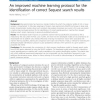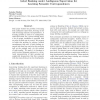25 search results - page 1 / 5 » Why Is Rule Learning Optimistic and How to Correct It |
ECML
2006
Springer
14 years 3 days ago
2006
Springer
Abstract. In their search through a huge space of possible hypotheses, rule induction algorithms compare estimations of qualities of a large number of rules to find the one that ap...
CSIE
2009
IEEE
14 years 3 months ago
2009
IEEE
In this paper, we describe a system for correcting English preposition errors automatically. Non-native English writers often make these errors. Our system uses rules extracted au...
BMCBI
2010
13 years 5 months ago
2010
Background: Mass spectrometry has become a standard method by which the proteomic profile of cell or tissue samples is characterized. To fully take advantage of tandem mass spectr...
EACL
2003
ACL Anthology
13 years 9 months ago
2003
ACL Anthology
Disfluent speech adds to the difficulty of processing spoken language utterances. In this paper we concentrate on identifying one disfluency phenomenon: fragmented words. Our d...
ICML
2010
IEEE
13 years 9 months ago
2010
IEEE
This paper studies the problem of learning from ambiguous supervision, focusing on the task of learning semantic correspondences. A learning problem is said to be ambiguously supe...


